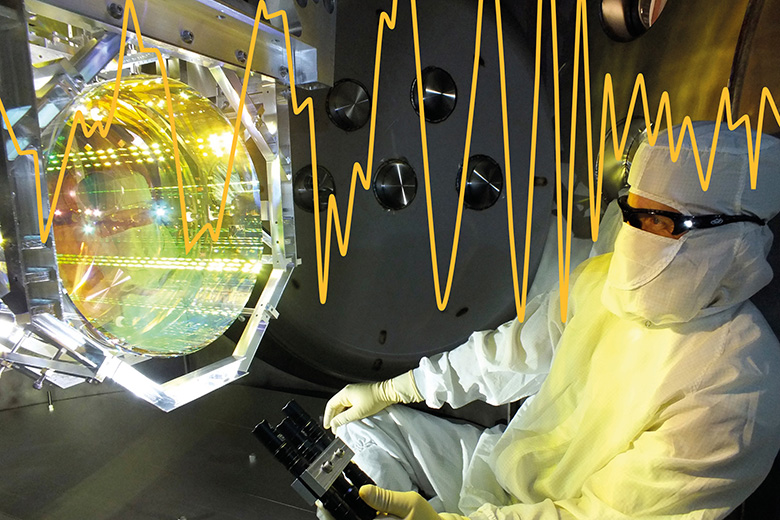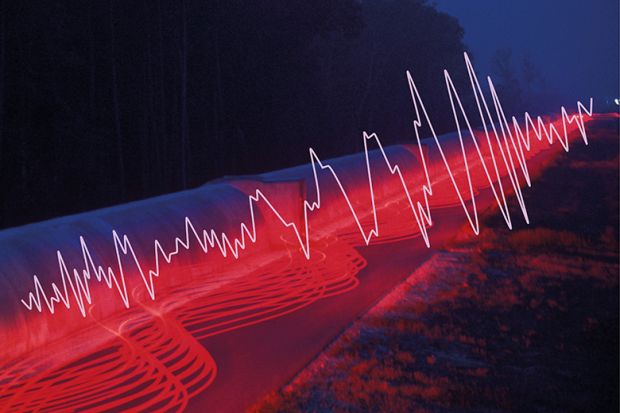For Harry Collins, the detection of gravitational waves in 2015 was “one of the greatest scientific discoveries of all time”. It certainly attracted newspaper headlines around the globe. The crucial revelatory waveform was turned into a logo, which appeared on T‑shirts, dresses and even a bathing cap. Physicists performed a new version of “I’m a Believer” (“I thought waves of gravity were fairy tales – fine for dilettantes, but not for me…Then I saw the graph – Now I’m a believer”). There were also, perhaps inevitably, a few sceptics who refused to accept the results and spoke of dark conspiracies – even including a claim that a number of physicists who might have blown the whistle on the conspiracy have since died in allegedly suspicious circumstances.
Yet for Collins, distinguished research professor in the School of Social Sciences at Cardiff University, the discovery had a more personal significance. Way back in 1972, he had begun conducting sociological research among a group of scientists who believed that they had already detected gravitational waves. That turned out to be a somewhat premature claim, but Collins continued to observe the community for more than four decades, hanging out with them, exchanging emails with them and attending their conferences all over the world.
This deep immersion has enabled Collins to produce several detailed insider’s accounts of a major scientific quest, including two about alleged detections that turned out to be the result of “blind injections” (where researchers deliberately create false signals as a way of testing the verification process).
“I always said I would write another book on gravitational waves if they were discovered before I went gaga,” he tells Times Higher Education. “I never expected it to happen!” In the meantime, his extensive work with this particular scientific community – only one of whose 1972 members is still working in the field – combined with shorter-term projects among others, has helped him to “develop a lot of the ideas which have spun off in other directions”.
Collins was a pioneer of what he calls Wave Two science studies. Wave One adopted the idealising view that scientists are pure, disinterested pursuers and revealers of the truth. Wave Two had its origins in the 1960s, with the publication of books such as The Structure of Scientific Revolutions by Thomas Kuhn, when scholars began to make the case that science was in fact a deeply social activity, subject to the same kinds of partiality and politicking as the rest of human life.
Collins remains committed to this central insight, but became increasingly concerned by the way that “Wave Two was taken up by people in the humanities who said: ‘Here’s a way of getting at science, raising the relative status of our disciplines and levelling the playing field.’”
A turning point came in 1998, when Andrew Wakefield claimed in a paper and a press conference that there might be a connection between the MMR (measles, mumps and rubella) vaccine and autism. A number of those working in science and technology studies stuck up for the rights of parents to refuse vaccination for their children on the grounds that they were defending the powerless against establishment science. Collins saw this as an irresponsible response to what had never been a genuine scientific controversy.
Much of his recent work in what he has named Wave Three is concerned with how to bring scientific expertise into public decision-making while also acknowledging all the ways in which science is socially constructed. In parallel with this, Collins has established himself as an expert on the nature of expertise – and here, too, he has become irritated by the sceptical direction that the field has taken. Asked to speak at conferences, he would “go to some distant place and say: ‘If it’s true that there’s no such thing as expert knowledge, why have you invited me? It cost you a lot of money to fly me here, and you could just have asked the next person passing in the street to give this talk.’”
Such themes come together in the two bold new books that Collins has just recently published. Gravity’s Kiss: The Detection of Gravitational Waves offers a gripping day-by-day account of how it became almost universally accepted that gravitational waves had finally been detected. Collins describes how, after the discovery had been made but not yet announced, he found himself “know[ing] more about this bit of astrophysics than Stephen Hawking”. He provides a definitive picture of what it was like for those working within the gravitational waves community: the doubts, the growing excitement, the dilemmas about who should be told when and the complex negotiations involved in producing a “discovery paper”.
He also reflects on what it means to say that science is a social activity. The book refers, for example, to “the idea that scientists have to agree to stop questioning at some conventional point [in the investigatory process] if anything is to count as a scientific finding; the conventional nature of what counts as a secure level of statistical significance; the fact…that the calculations that give rise to a finding are based on judgements… All these things are descriptions of science that show it to be embedded in social agreements and therefore social life.”
Despite these philosophical points, however, Collins offers a largely admiring account of what the researchers have achieved, describing it as “the culmination of one of the most astonishing passages of single-minded perseverance there has ever been in peacetime”. And, for his own part, he is totally convinced of the existence of gravitational waves, even though, as he puts it in the book, he has “not seen a thing directly; I’ve just heard a lot of stories from people I trust”.
The issue of trust in science has been high on the agenda recently amid concerns about the number of high-profile papers that appear not to be reproducible. So what is Collins’ general position on researcher integrity?
“I have no idea what the results would be of a general survey of how honourable people are in science,” Collins responds. “But I believe that in gravitational wave physics 90 or 95 per cent would be people of enormous integrity – that’s precisely why I stayed in it for so long: because I enjoyed working among them. If it is [higher than in] other sciences, then I can give you some reasons: [gravitational wave physics] has been a beleaguered community for all this time, so they’ve felt themselves to be a united set of insiders facing an outside world and, therefore, having to do it for the truth of the matter, rather than for glory, because there wasn’t any glory until [the official public announcement on] 11 February 2016.”
But is there a risk that, like an “embedded” journalist in a war zone, Collins has become too close to the people he is writing about, and so too favourable in his perception of them?
“There is a danger of going native,” he admits, “but the last few chapters of my book are highly critical of the community for the level of secrecy they went in for.” This refers to the post-discovery phase, when the scientists were pretty much convinced that the detection was real but were still checking their results, so they kept journalists at bay by implying that it might just have been another blind injection.
This, in Collins’ view, was “totally unnecessary: “You can say, ‘We think we’re on to something, but we don’t know because it’s going to take us five months to sort it out, and we’ll tell you in five months.’ That’s all you have to say.”
He admits to being a bit of a “prig” about honesty, but also seems genuinely disappointed to find his “favourite scientific community working as a kind of academy where everybody is being taught to lie to journalists”. He is also disappointed by the brash triumphalism that some later adopted about their own achievements.
But isn’t it asking a bit much of scientists not only to behave with integrity on the important issues but also to avoid even boastfulness and the occasional white lie? Aren’t marketing and hype sometimes inevitable, most obviously in fundraising?
“Fundraising certainly tempts people into a kind of showmanship,” agrees Collins, “but it’s a dangerous game. You need a long spoon to sup with the devil. If you encourage the public to value science for the show, what is going to happen when [the public] decides it wants a different kind of show? You need to be selling science for a deeper and more profound reason. The standard reason is that it delivers economic goods. We want it to be sold much more because it delivers cultural goods.”

This brings us to the central theme of Collins’ second new book, written with his long-term collaborator Robert Evans, reader in sociology at Cardiff. The book, Why Democracies Need Science, is “riddled with claims as to the naivety of its authors”, Collins notes cheerfully. Its aim is to “make science’s special nature clear, and show society what it stands for, before it is overwhelmed by the free-market tsunami like so much else”. And that is because Collins and Evans believe that “scientific and technical experts have the potential to protect democracy” and that science as an institution “can give moral leadership”.
To make absolutely clear what they are claiming, the authors make a point of stating that we should value science even when it is ineffectual. In so far as econometricians, for example, behave like scientists by being sceptical, disinterested, open to criticism and “trust[ing] observation above revelation”, they embody admirable qualities and should be respected for it, even if their forecasts about inflation or unemployment rates are currently no more accurate than the predictions of astrologers.
“The bottom line is not the utility of the opinions but the values,” explains Collins. “Even if science was all as unreliable as econometrics, I think I would still prefer a society which valued science.”
This view, he acknowledges, might be seen as naive in two respects. There is the “moral naivety” of wanting scientists to live up to high ideals and “a hope they can act like this. [But] we should be encouraging people to act like this even if it’s hopelessly naive in today’s world.” Then there is “the epistemological naivety of scientists, including social scientists, having to believe they are finding the truth, because that is the driver [of their endeavours]”.
To illustrate this point in the book, Collins and Evans cite the scornful claim of the physicist Richard Feynman that the philosophy of science is “about as useful to scientists as ornithology is to birds” – and agree that he is in essence correct.
“One cannot do good science without disbelieving social constructivism,” they write. “Individual scientists have to believe they are seeking the truth and that there is a chance of finding it, even while social scientists insist it is social groups that ultimately determine what counts.”
The book, in other words, walks a tightrope, attempting to “justify scientific expertise…while making it as hard for ourselves as possible by accepting pretty well everything from the social constructionist critique of science that has emerged since the 1960s”.
Some of Collins’ fellow Wave Two pioneers now regard him as a renegade for his embrace of science as a mechanism by which truth may be discovered – and he, in turn, no longer speaks to them. Considering the seemingly rarefied nature of the dispute, passions run surprisingly high. In the preface to an earlier co-authored book, Rethinking Expertise, Collins and Evans make a point of thanking “those colleagues whose attempts to stop our work being published, or even referenced, make novels of academic life seem dull”.
So how would they like to see scientific insights applied to real-world problems? Although we may never be able to remove politics completely from science, that is always the ideal that we should aim for; as far as possible, the technical and political phases of policymaking should be kept separate. Building on the role of government scientific advisers, Collins and Evans propose a detailed set of mechanisms for communicating the scientific consensus – and the strength of that consensus – to policymakers. These should help prevent politicians from citing some long-discredited maverick whose claims happen to support their prejudices or political needs as evidence that they are taking account of “the science”. If they want to override the scientific consensus, as they are perfectly entitled to do, they would have to do so openly.
Much of this, as Collins readily concedes, risks sounding highly idealistic in an era of “post-truth politics”. As he puts it: “We started on the discussion of expertise in 2002, at a time when it seemed a matter of making certain conceptual points, and with horrifying suddenness it’s become today’s big political problem…If we start dissing experts to the extent that you no longer rate the opinion of those who know what they are talking about higher than [the opinion of] those who don’t, then we are going to start moving into a dystopia – and it has horrible political precedents.”
In his view, “what really needs to happen is for some novelist to take over [our] thesis and write a dystopian novel about what happens in a society where people take no notice of experts”.
Others might say we just need to keep watching the news.
Harry Collins’ Gravity’s Kiss: The Detection of Gravitational Waves is published by MIT Press. Harry Collins and Robert Evans’ Why Democracies Need Science is published by Polity.
POSTSCRIPT:
Print headline: Authoritative testimony
Register to continue
Why register?
- Registration is free and only takes a moment
- Once registered, you can read 3 articles a month
- Sign up for our newsletter
Subscribe
Or subscribe for unlimited access to:
- Unlimited access to news, views, insights & reviews
- Digital editions
- Digital access to THE’s university and college rankings analysis
Already registered or a current subscriber? Login




